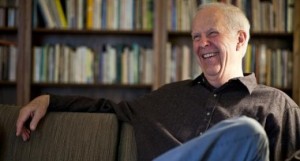 Continuing my reflections on Parker Palmer’s five ‘shadow-casting monsters’ in the life of a leader from his book Let Your Life Speak, I turn now to numbers three, which is: “‘Functional atheism’, the belief that the ultimate responsibility for everything rests with us” (88).
Continuing my reflections on Parker Palmer’s five ‘shadow-casting monsters’ in the life of a leader from his book Let Your Life Speak, I turn now to numbers three, which is: “‘Functional atheism’, the belief that the ultimate responsibility for everything rests with us” (88).
Here’s a bit more from Palmer on this one:
This is the unconscious, unexamined conviction that if anything decent is going to happen here, we are the ones who must make it happen – a conviction held even by people who talk a good game about God. (88)
What do you think about this one? After working within a few different churches in the evangelical tradition, I’m tempted to wonder if this is one of the most pervasive of Palmer’s monsters in that church tradition at present. I find it in myself, too.
Let me stop to ask some tough questions:
- do I think I own my leadership tasks more than God does?
- do I feel the need to shoulder everything on my own, or do I submit myself to God and His ways (‘not my will, but Your will be done’)?
- am I considering what is mine to do and what is not mine to do, or do I try to do everything?
- do I even think about God in all of this?
For those who are able to master this monster, Palmer writes these words:
We learn that we need not carry the whole load but can share it with others, liberating us and empowering them. We learn that sometimes we are free to lay the load down altogether. The great community asks us to do only what we are able and trust the rest to other hands. (89)
I’d love to hear some feedback and comments on this.
Discover more from Matthew Erickson
Subscribe to get the latest posts sent to your email.

Matt – I think this is directly tied to monster #1 – our own insecurity and seeking significance in doing something great. All to often we think that to be pillars of the Christian community we must do great things for God but often they are things we do for ourselves to build up our own perceived significance. As I ponder where God is directing me on the next part of my life I find a struggle for significance to be a big part of my thoughts. If we are convinced we must do something to bring about the good then we tend to rely less on God and the whole purpose of our efforts is lost in the doing. I find comfort in Parker’s contention that if we learn this lesson that it is freeing – opening us up to the work and efforts of God through others and sharing the burden.
Thanks to reflecting about that here, Geof. I appreciate you pointing out how these different monsters tie in with on another. Clearly, these all touch on deep places in our identity and our longings.
Agree with Geof. These 2 monsters are mutually reinforcing.
For me, I tend to invite God in to either bless the things I’ve already done or wait to reach out until I’ve come to things that are “too big” for me. When I’m thinking clearly, I recognize that I need God for all things and that he owns any leadership gifting I may have.
Thanks, Tom. This is so true. In his introduction to this section of the book, Palmer writes: “If we, as leaders, are to cast less shadow and more light, we need to ride certain monsters all the way down, explore the shadows they create, and experience the transformation that can come as we ‘get into’ our own spiritual lives” (85). I like the image here of riding the monsters down, of wrestling them down through healthy self-reflection, and ultimately entering into a deeper place of spiritual transformation with God.
I think that the most powerful things happen when we are acting out of our weakness. Then, we experience the presence of God because we know that we did not acheive on our own. It also becomes a great witness to others when they see that we could not have done it on our own. Experiencing God this way helps faith grow and changes how you follow him. Those outcomes are precluded If we start with the mind set that we should utilize our strengths to ensure our success as a path to accomplishment or significance,
While the Holy Spirit does give spiritual gifts to the body of Christ for the building up of the church and the accomplishment of His mission, there is something particularly powerful about how God works through our weakness. The Apostle Paul writes about that: “But he said to me, ‘My grace is sufficient for you, for my power is made perfect in weakness.’ Therefore I will boast all the more gladly of my weaknesses, so that the power of Christ may rest upon me”
(2 Corinthians 12:9 ESV).